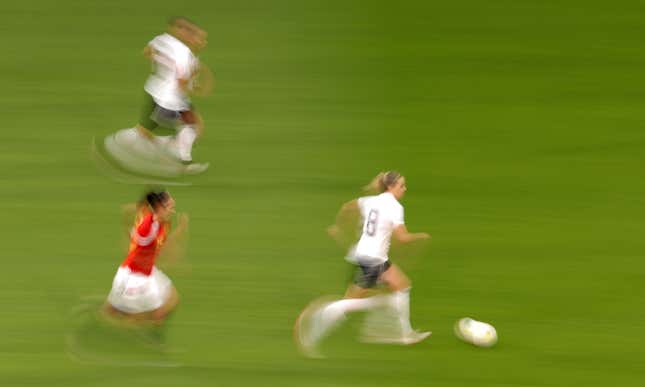
BERLIN — “We play for a nation that doesn’t even know our name.” So begins a video released last month by the German national women’s soccer team, right in time for the start of the Women’s World Cup. Die Nationalelf, two-time World Cup winners and one of the favorites in the tournament, was packing for their trip to France, where they’ve already gone 2-0-0, sitting atop their group and qualifying for the knockout stage. The whole thing should have felt reminiscent of last year, when the men’s World Cup had Germany neck-deep in German flags stuck to car windows and waved from balconies, Thomas Müller was on TV all the time trying to sell men’s razors, and every single corner store, bar, pub, hair salon, and kebab shop had somehow acquired a television to stream every last game until the bitter end. The fact that the men went on to perform abysmally didn’t damper the enthusiasm too much.
This time around, the streets in Berlin are quiet, the flags are tucked away, and the only football anyone was really talking about were the men’s Eurocup qualifier games in Belarus. You’d be forgiven for not even knowing that the women’s World Cup was taking place right across the border in France, with one of the highest-ranked soccer teams in the world competing for a trophy that no one back in Germany seems to really care about. This isn’t really a surprise here. Women’s sports—especially sports that are traditionally considered male domains on a professional level, such as soccer and basketball—have always been treated as little more than a joke. And in soccer-obsessed Germany like in few other nations, women’s soccer has always had to struggle against the dominance of the men, regardless of performance.
The evidence is everywhere: From pay discrepancies—the men would have gotten €350,000 each if they had won the Cup last year, whereas the women will only get €75,000 if they win this year—to a lack of public-viewing options in a country that usually doesn’t miss an opportunity to turn a soccer game into a spectacle, you don’t need to spend time on social media to realize that the general enthusiasm for the two-time champions is lukewarm at best.
In releasing this video, it looked on the surface like the women’s national team was making a statement: They’ve had enough. Produced together with one of their sponsors, a major national bank, the team appeared to finally speak up against the prejudices they face at home. In the video, team members defiantly face the camera and confront the viewer directly: “Ever since we’ve been around, we don’t just face opponents; we also face stereotypes.” They know the drill: Women’s soccer is played “in slow motion,” it’s “amateurish,” and they should just “go back into the kitchen”—the players have heard it all. Meanwhile, they point out that they’ve won the Eurocup eight times (the men’s team have won three). The video then cuts to national trainer Martina Voss-Tecklenburg, goalie Almuth Schult, and defender Kathrin Hendrich drinking tea from a tea set—the very same tea set that the national team received as a prize from the German Football Association (DFB) in 1989 for winning the Eurocup. So yeah, there’s plenty to be angry about.
And just as you think they’re gearing up for a grand “fuck you” to the German media, the DFB, and the people who don’t give a shit about them, they launch their tagline, which (clumsily) translates to: “We don’t need balls, we’ve got ponytails.”
It’s unfortunate, really. Instead of calling out the German media and the public for continuously ignoring their sport and denying them respect for their achievements—not to mention a fair wage—the video pivots by suggesting that the women can take it, because they just love the game so much. “We don’t care that you don’t remember our faces, as long as you remember what we care about: Playing,” the video ends, effectively handing out carte blanche to viewers to continue to continue not caring. It’s okay, the ladies told us they don’t mind!
Cut to the day before the World Cup started, when Adidas delivered Schult with a pair of shoes that misspelled her name.
I understand that it’s probably not smart marketing to antagonize wide swaths of people when you’re already struggling to attract attention, but the German team has every right to be frustrated. I’m frustrated. I tried to watch Germany’s first match against China on Saturday, and most public viewing places that will show even the dinkiest second-league game weren’t showing it. The figures get even worse if you’re trying to watch women’s soccer outside of a huge event like the World Cup. Only two of every six games in the female Bundesliga get shown live, and you have to subscribe to a private provider to watch. The games of the DFB-Pokal Frauen—the women’s knockout cup—only get shown on public-access television, and only from the semi-finals onward. No wonder so few people are watching.

It’s too simplistic to simply chalk this up to the global state of the sport. Countries like the United States, England, and France have pretty vibrant women’s soccer cultures, and the support for many African women’s teams has become significantly more visible. The USWNT is suing for equal pay, a concrete, late-stage move in a debate that isn’t really even being held in Germany. There is something unique happening here in Germany: a supposedly soccer-mad country that ignores half its soccer.
Women’s soccer in Germany has long had a contentious relationship with the national governing body, going all the way back to 1955 when the DFB just straight-up banned women from playing. The ban lasted 15 years, and since then, the DFB has repeatedly been accused of insufficient support for women, including laughable marketing efforts, scheduling kick-off times to the middle of the day when less people are likely to watch, and waving away equal pay demands by explaining that female players don’t have the same marketing opportunities that men do—which is surely true if you spend almost nothing on marketing women’s soccer in the first place.
The promo video—a pretty big marketing opportunity, by the way—was hailed in Germany as “snarky” and “provocative,” but the team just can’t seem to escape the gender binary that they find themselves stuck in to begin with. In the video, the players say tongue-in-cheek things like “we like wearing over-knees,” as they put on their uniform socks; that they like to dance, as they’re shown dribbling; and that they like men who know what they want, while a little boy asks a player for an autograph. It’s supposed to show that these women are athletes who are subverting gender stereotypes, but even by acknowledging them they can’t help but perpetuate them. At the end of the day we’re still talking about women putting on makeup.
To joke about gendered comments, even when meant to be subversive, just ends up reinforcing the belief that it’s okay to make those gendered comments. It’s still depressingly normal for pundits to comment on the players’ appearances during public commentaries, or for reporters to players whether there are any catfights in the locker rooms. Judging from the local coverage in the early days of this World Cup, this hasn’t shown any signs of changing: After the 1-0 win against China, the tabloid Bild proclaimed that “our prettiest one, of all things, got us the win,” referencing captain Alexandra Popp’s comment about midfielder Giulia Gwinn being “the prettiest” and “really caring about her appearance.”
All this talk about what is or what isn’t a real woman is a conversation with no possible outcome but distraction. It continues to emphasize that it’s a different animal than the men’s game, and that therefore the unequal compensation, lacking recognition, and indifferent media are, if not acceptable, then at least understandable. To have some of the best players in the world then also say that it’s okay if Germans can’t remember their faces or names—not to mention being paid significantly less—feels doubly defeating. The national team deserves better, and it’s more than fair for them to demand it even more loudly than they have.
Luisa Rollenhagen is an Argentinian-German journalist who writes at the intersection of politics and culture. You can find her complaining about things on Twitter @lulurollenhagen and check out her writing at www.luisarollenhagen.com. She’s currently based in Berlin.